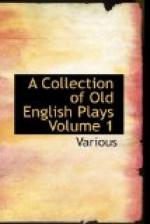[190] ‘Totter’d’ i.e. tatter’d. Cf. Richard II. (iii. 3) ’the castle’s totter’d battlements’ (the reading of the 4to.; the Folios give ’tatter’d’). In King John (v. 5) I think, with Staunton, that the expression ‘tott’ring colours’ means ‘drooping colours’ rather than, as usually explained, ‘tattered.’
[191] ’Spurn-point—An old game mentioned in a curious play called Apollo Shroving, 12mo., Lond. 1627, p. 49.’ Halliwell.
[192] ’Grandoes’—I find the word so spelt in Heywood’s A Challenge for Beauty—’I, and I assure your Ladiship, ally’de to the best Grandoes of Spaine.’ (Works, v. 18.)
[193] 4to. Albia.
[194] Cornego is telling the Captain to ’duck’—to make his bow—to Onaelia.
[195] Nares quotes from the Owles Almanacke, 1618, p. 6, an allusion to this worthy,—’Since the German fencer cudgell’d most of our English fencers, now about 5 moneths past.’
[196] It is hardly necessary to remind the reader that ‘bastard’ was the name of a sweet Spanish wine.
[197] ’Goll’—A cant expression for ‘hand’: it is found continually in our old writers.
[198] The words ‘Some scurvy thing, I warrant’ should no doubt be given to Cornego.
[199] The conversation between Onaelia and the Poet very closely resembles, in parts, Character 5 of John Day’s Parliament of Bees.
[200] 4to lanch.
[201] ‘The Hanging Tune’ i.e. the tune of ‘Fortune my Foe,’ to which were usually sung ballads relating to murders. The music of ’Fortune my Foe,’ is given in Mr. Chappell’s ‘Popular Music of the Olden Time’; and the words may be seen in the ‘Bayford Ballads’ (edited by Mr. Ebsworth, our greatest master of ballad-lore).
[202] Cf. Dekker’s Match me in London (Dramatic Works, iv. 180)—
’I
doe speake English
When I’de move pittie;
when dissemble, Irish;
Dutch when I reele;
and tho I feed on scalions
If I should brag Gentility
I’de gabble Welch.’
[203] Cf. Day’s Parliament of Bees, Character 4.
[204] ‘Estridge’ is the common form of ‘ostrich’ among the Elizabethans (I Henry IV., iv. 1, &c).
[205] “Poire d’angoisse. A choke-Peare; or a wild soure Peare.” Cotgrave.
[206] 4to. Moble.
[207] Quy. head.
[208] “Prick-song”—“harmony written or pricked down, in opposition to plain-song, where the descant rested with the will of the singer.” Chappell’s Popular Music, &c., I. 51.
[209] The keys of the ‘virginal’ were called ‘Jacks.’ For a description of the ‘virginal’ see Mr. Chappell’s Popular Music, &c. I, 103.
[210] ‘Coranta’ i.e. curranto, news-sheet: Ben Jonson’s ‘Staple of News’ gives us a good notion of the absurdities that used to be circulated.




